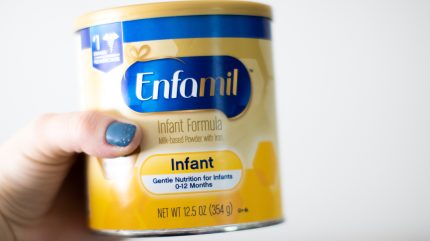
Reckitt Benckiser will seek to “overturn” a US court decision awarding $60m in damages to the mother of a baby that died after being fed Enfamil Premature 24 infant formula.
The media platform Law.com reported that an Illinois jury granted the damages against the UK-based CPG major’s baby-food unit Mead Johnson, the maker of the Enfamil brand range, on Wednesday (13 March).

Discover B2B Marketing That Performs
Combine business intelligence and editorial excellence to reach engaged professionals across 36 leading media platforms.
Reuters reported the premature baby of Jasmine Watson died from the intestinal disease necrotizing enterocolitis (NEC) after being given Enfamil Premature formula.
The news agency said the jury sitting on the case in the Illinois state court in St. Clair County found Mead Johnson was ‘negligent’ because the company failed to warn mothers of the risks to premature babies from NEC as a result of consuming that type of infant formula.
According to the National Institutes of Health (NIH) in the US, NEC is a life-threatening illness with a mortality rate of up to 50% and mostly affects “neonates”.
“The pathophysiology of NEC is inflammation of the intestine leading to bacterial invasion causing cellular damage and death, which causes necrosis of the colon and intestine,” NIH says.

US Tariffs are shifting - will you react or anticipate?
Don’t let policy changes catch you off guard. Stay proactive with real-time data and expert analysis.
By GlobalDataReckitt’s defence
Reckitt defended the company’s position in a statement posted on its website today (15 March).
“We stand by the safety of our products. We do not believe that any of our products cause NEC. While we continue to offer our deepest condolences to Ms. Watson, we strongly disagree with the jury’s decision to fault Mead Johnson and award damages,” the company said.
“We continue to believe that the allegations from the plaintiff’s lawyers in this case were not supported by the science or experts in the medical community. This was underscored during the trial by a dozen neonatologists. We will pursue all options to overturn the verdict.”
Analysts at Barclays issued a research note on the Reckitt case involving Ms. Watson and suggested there are perhaps 400 other cases in the US with respect to NEC linked to infant formula, grouped together under the code MDL 3026.
Ms. Watson’s baby, Chance Dean, was “fed infant formula by medical professionals in an neonatal intensive care unit”, the analysts wrote.
They added: “Breastfeeding is known to substantially reduce the risk of NEC, and it was successfully claimed that Reckitt had failed to adequately warn that infant formula feeding increased the risk of NEC.
“Reckitt’s defence was in part that medical professionals are well aware of the increased risk of NEC associated with formula feeding, and that national clinical guidelines and hospital policy is to only infant formula feed premature infants when breastfeeding was impractical, for that exact reason.
“The central issue here is premature infant formula as a category, rather than any Reckitt specific allegations of product contamination or similar.”
Reuters carried a statement from Ben Whiting, the lawyer of Ms. Watson: “This verdict confirms what Mead Johnson has known for years: cow’s milk-based baby formula causes NEC in pre-term infants, often with fatal consequences.”
Barclays’ view
The Barclays’ analysts continued: “Appeal chances seem reasonable, £2bn ($2.5bn) settlement looks to be absolute worst case, likely far less.
“Reckitt has stated its intention to appeal and given that the importance of breastfeeding premature infants wherever possible to reduce the risk of NEC is national clinical policy, appears to have reasonable grounds on which to do so.
“However, given the unpredictability of the US legal system on tort issues, we think it’s important to consider worse-case scenarios.”
They added with respect to the suggested 400 case numbers: “There is scope for this number to grow, although the rarity of NEC means that plaintiff numbers are likely to at most reach the thousands, unlikely the tens or even hundreds of thousands seen in other US mass tort cases.
“Ultimately, we think a realistic worse case is a few thousand plaintiffs settling in the high hundreds of thousands of dollars a case. An extreme financial worst case for Reckitt would, in our view, be £2bn of damages, which if funded by reducing the buyback, would be c.6% dilutive to 2026e EPS.”
Separately to the case involving Ms. Watson, Reckitt initiated a recall in the US late last year related to Mead Johnson’s Nutramigen Powder due to possible contamination from the Cronobacter sakazakii bacteria.
Batches of Nutramigen Powder were recalled as a precautionary measure in December. Reckitt said tests carried out by Mead Johnson proved negative for the pathogen, which can cause serious illness, particularly in children.
The recall was extended to the UK in January.





